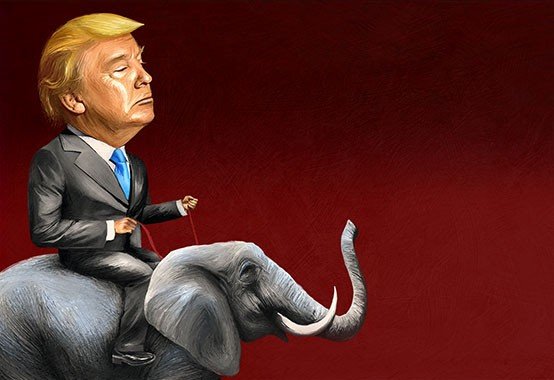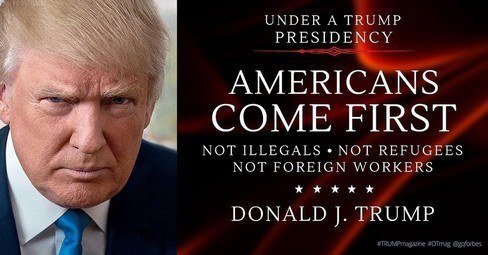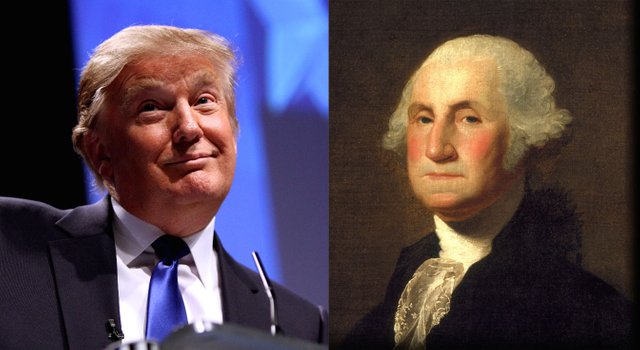Understanding Trump
Trump Channels Buchanan
I was waltzing through the public library the other day and made my regular stop at the new bookrack. What would I espy there but a book by Patrick Buchanan, Day of Reckoning. I kind of like Pat, so I checked it out. (Jewish joke: “Don’t mess with Buchanan. His father died at Auschwitz. He fell out of a guard tower.”)
I started reading, but was a bit discombobulated by the first few pages. Pat was spending an inordinate amount of time bashing Bush. Turning to the face pages I found the book was published in 2007, at the end of Bush’s second term! What was it doing in the new book section?
By the time I’d finished reading I understood. The book is a skeleton key to Trump's platform; heretofore, for me, something of a mishmash of disparate ideas (I had unconsciously bought into many establishment nostrums). That the Dems hate Trump is perfectly understandable, but the book makes clear why the Republican establishment hates him more -- Trump is a paleo/traditional-conservative, not a neo-conservative. Neocons are relatively new to the scene (since the '70's), essentially “liberals mugged by reality” in Irving Kristol’s immortal phrase, but they currently dominate the Republican establishment. “Paleo-conservatism” is really just an expression of traditional republicanism, the founding principles of the Nation. Trump is firmly within the train of thought of small ‘r’ republicanism, and anyone who claims he doesn’t profess a consistent, well thought out political philosophy is simply wrong.
For those not familiar with American political ideology (and that includes many Americans) there is no mistaking that Buchanan is from the Right as is the Donald, and between Hillary and her minions, the twain shall never meet. The interesting question is where do Buchanan and Trump lineup vis a vis the Establishment Right. Let’s look at where Buchanan parts way with the neo-Conservatives, and compare these positions with various Trump heresies.
America First
America First was an anti-war movement prior to the U.S entry into WWII. Wiki notes some of the luminaries of the group: “future President Gerald Ford, future Peace Corps director Sargent Shriver, and future U.S. Supreme Court justice Potter Stewart. Future President John F. Kennedy contributed $100, along with a note saying "What you all are doing is vital . . . [Business figures included] William H. Regnery, H. Smith Richardson of the Vick Chemical Company, General Robert E. Wood of Sears-Roebuck, Sterling Morton of Morton Salt Company, publisher Joseph M. Patterson (New York Daily News) and his cousin, publisher Robert R. McCormick (Chicago Tribune)." From that Wiki entry on the organization:
Conservative commentator Pat Buchanan has praised America First and used its name as a slogan. "The achievements of that organization are monumental," writes Buchanan. "By keeping America out of World War II until Hitler attacked Stalin in June 1941, Soviet Russia, not America, bore the brunt of the fighting, bleeding and dying to defeat Nazi Germany.”
America First represented old-line small “r” republicanism which favored trade in the interest of the U.S. and limited foreign entanglements. Neocons favor absolute free trade almost as a mantra, and are all too comfortable with the U.S. as the world’s policeman, forcing democratic change in countries hostile to it, and lots of foreign entanglements, in the form of defense treaties.
Trump’s platform slogan is “Make America Great Again” and subsumes many of the old-timey republican values. That puts him at odds with the neocons.
Foreign Policy
Buchanan points out that although the U.S. spends more than any nation on defense, out foreign commitments greatly overshadow our military might:
“With such military assets, how can it be said U.S. foreign policy is bankrupt? To answer this question, we must look at the other side of the balance sheet--the liabilities, the commitments we have made to go to war on behalf of other nations.” p 111
Following that statement in the book are pages of discussion of foreign treaties (entanglements) that obligate the U.S. to go to war in order to defend this or that small nation unable to defend itself.
Trump has uttered many things that don’t jibe with Republican orthodoxy, and has earned him the opprobrium and ridicule of the Establish; for instance, suggesting allies should pay for U.S. protection, questioning NATO, and waffling on whether he’d go to war to protect Lithuania from Russian aggression. Compare Buchanan:
[We] should review every alliance and terminate virtually all of them. For alliances are the transmission belts of war . . . Britain went to war with Germany in 1914, the bloodiest war in all of history up to that time, because the king of Belgium called on the king of England to honor a commitment to Belgian neutrality the British had entered into—in 1839. p. 253
Republicans were shocked to hear, during the primaries, Trump’s denunciation of Bush for the Iraq War. I couldn't believe my lying ears! The NYT’s etal says Trump’s dishonest about opposing the War, but Buchanan sure did. Trump, a business mogul at the time, did too.
As to the bromance with Putin, Putin advisers are familiar with traditional U.S. republicanism, and recognize that Pat and the Donald are in that camp. Buchanan writes:
“Under Bill Clinton and George W. Bush, America began to treat Russia as a defeated nation whose interests did not matter and whose opinions could be ignored . . . Can we not appreciate the sensibilities of Russia?” p 121-124.
Maybe the Russians do want Trump?
Trade
Buchanan writes:
What Friedman and the free traders fail to understand or ignore is that the transfer of production aboard is not free trade. Unlike the export of goods, which adds to GDP, the transfer of factories subtracts from U.S. GDP and adds to [that of foreign nations] p 201
As the world economy has changed, so too has the way trade works out for the U.S. economy. The U.S. was protectionist until post-WWII. After WWII, free (freer) trade made perfect sense for the U.S. because it was the only nation with its industrial facilities unharmed. We supplied the world. In contrast, today free trade puts American industry and jobs up for auction, and we are losing that auction in completion with hundreds of million of people happy to work for much less than Americans, and financiers willing to build plants using U.S. know-how in foreign lands.
That about summarizes the views of Buchanan and Trump, and is totally at odds with the neocons.
Immigration
“America is today less a nation than an encampment of suspicious and hostile tribes quarreling viciously over the spoils of politics and power. We live on the same land, under the same set of laws, but we are longer the one people of whom John Jay wrote in Federalist No. 2.” p 179
Pat has long railed against immigration policy. He includes a 10-point list that includes no amnesty, a fence, no birthright citizenship, ending chain migration and limiting immigration. Trump has made the fence a clarion call of his campaign, and is pretty much simpatico with Buchanan on immigration. As to Muslim immigration—forgetaboutit:
Wherever Islam rubs up against other civilizations, there is violence . . . p 5
Globalization is a big tent of ideas, all of which are anathema to Buchanan
Few nations are as multiracial, multiethnic, multilingual, and multicultural as the United States. And as Talbott wrote, "The big question these days is which these days is which political forces will prevail, those stitching nations together or those tearing them apart?” This is the existential question facing America. Will what separates us—race, ethnicity, culture, morality, and faith—prove stronger than what unites us? p 5-6
In earlier books, Buchanan has pointed out that “multi” countries have never once discovered a formula to reduce tensions between groups. The Obama/Hillary Democrat Party are hell bent on inflaming these tensions (e.g. class warfare, racism, identity politics, 'deplorables').
Dan Quayle illustrates the neocon take. When asked about ethnic riots, he said ‘diversity is our strength’. But that’s at odds with the national motto “E pluribus unum”—out of many, one. (p 6) From unity comes strength. The trick is to get everyone on the same page.
Donald is close to Buchanan but takes a markedly more optimistic, holistic approach—he basically ignores any sort of difference . . . as long as you’re an American.
Culture War and the Supreme Court
It was the nationalization of moral issues by the Supreme Court, and its no-appeal dictates . . . that turned the culture war into America’s second civil war. There are two ways toward truce. One is to create a Supreme Court of justices who will leave these decisions with the states. The other is for the Congress to reassert its authority over these issues . . . p 242
Denying authority to the Supreme Court would be via a barely used provision of the Constitution, Article III, Section II, which reads in relevant part “the supreme Court shall have appellate Jurisdiction, both as to Law and Fact, with such Exceptions, and under such Regulations as the Congress shall make.” So Pat suggests if you don’t have the justices, you can simply remove jurisdiction on specific issues through the legislative process. Man, get out the popcorn when that thesis is tested before the Court!
The Donald talks about the Supreme Court, but it’s mostly in the context of appointing justices. He’s studiously avoided the typical hot topic cultural issues, but has changed the grounds of the debate to things like school choice, hostility toward NYT v. Sullivan and allowing churches to speak freely on political issues.
The neocons have been much too soft for their base on the issue of judges, justices and the court system, and I think a lot of it is because they are closer to their old colleagues on the Left than they are to the American people. Full-grown men entering woman’s bathrooms based on a claim of gender ambiguity? Doesn’t sound that bad to the neocons.
Is America ready for small 'r' republicanism?
I kind of liked Trump’s positions on the issues from the get-go, because my main concern was nominating someone who could win against the built-in advantages the Dems have with ethnic minorities and the electoral college. It seemed to me that Trump had inventoried the polled positions of the voters on a number of issues, and then assumed as his own the ones with 60%+ voter support.
That isn’t quite right. Trump embraces what has been called Modern Conservatism (by Buchanan), or paleo-conservatism (by neocons and the Left) or, as I prefer, small ‘r’ republicanism, and he does it forcefully and consistently without regard to politics. He speaks his mind and says ‘screw political correctness’.
Trump has a unique, fresh perspective on being a politician. He’s bought politicians and has heard all their dirty secrets at garden parties and in boardrooms. He doesn’t have much respect for most of them and finds himself bemused that he now is one of them. He endured relentless negative (vicious, really) political ads against him in the primaries and now in the general but, as a business man, decided that free media and huuuge rallies (and lots of them) were the best emphasis for a campaign. Professional politicos question that strategy because it jeopardizes their feedbag.
Although one can understand Trump by reading Buchanan, he’s not Buchanan. Buchanan is an upbeat, happy guy in many ways but, when it comes to the future of America, he is morosely pessimistic. Trump is not that at all. If he loses this election he concedes that the nation is toast, but hey, he can just go back to his penthouse in Trump plaza and to his beautiful wife, wonderful children and 10 billion dollar business empire. Plus, he’s still in Washington: he owns ‘the best hotel in the world’ on Pennsylvania Avenue (the old Post Office) where he can stay for free (which he completed ahead of schedule and under budget). Better digs than the White House.
Buchanan feels that so many bad decisions have been made that the country is probably beyond saving as a beacon of freedom for the world. Trump genuinely believes that he can set everything right if he is elected (so do I). Buchanan wrings his hands regarding multiculturalism etal, but Trump isn’t worried. He sees the world in terms of mass media.
For instance, almost everyone loves football. Every team has fans and the fans always include people of every race, sex, creed, and hair color. Trump wants to be the CEO of Team America, and seeks to have most Americans cheering like fans/shareholders of America, Inc. America First! Make America Great Again! What do you have to lose!
And he’s sincere about all of it. He may not be of your Daddy’s Republican Party, but he is of your Grandfather’s Republican Party. After this election, win or lose, it’ll be your small ‘r' Republican Party.



Without really commenting on Trump or his policies directly -- I think this stands out:
Free Trade, in itself is a good policy. The challenge is whether American businesses can compete in a Free Market. The primary argument against it, is that US businesses can't compete.
If that is the case, what's the approach to address this? Allow Free Trade, and force businesses to innovate in order survive? Or create a 'safe space' where they get some safety and hope that they innovate slowly. I think the latter may take away incentive to innovate.